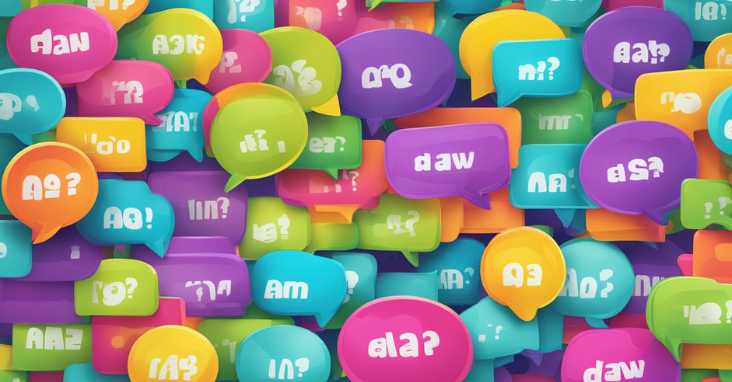How to engage with candidates with fun interview questions? Use creative prompts & interactive tasks in interviews to spark engaging conversations and reveal candidates’ true potential.
Fun interview questions are becoming increasingly popular among recruiters and hiring managers. These questions are designed to not only assess a candidate’s skills and experience but also their personality and creativity. They can help break the ice and create a more relaxed atmosphere during the interview process, which can lead to better insights into the candidate’s potential fit within the company culture.

Understanding Fun Interview Questions
Fun interview questions are not meant to be taken lightly, and they should still be relevant to the job and the company’s values. They can be used to assess a candidate’s problem-solving skills, creativity, and ability to think on their feet. These questions can also reveal a candidate’s communication skills, confidence, and sense of humor. It’s important to note that while these questions can be entertaining, they should not be used to discriminate against candidates based on their race, gender, or any other protected characteristic.
Types of Fun Interview Questions
There are many types of fun interview questions, including hypothetical scenarios, brain teasers, and personality assessments. Hypothetical scenarios can be used to assess a candidate’s decision-making skills and how they would handle certain situations. Brain teasers can test a candidate’s problem-solving abilities and creativity. Personality assessments can give insight into a candidate’s values and motivations. It’s important to choose the right type of question for the job and the candidate to ensure that the interview is effective.
Key Takeaways
- Fun interview questions can help create a relaxed atmosphere during the interview process and reveal a candidate’s personality and creativity.
- These questions should still be relevant to the job and the company’s values and should not be used to discriminate against candidates.
- There are many types of fun interview questions, including hypothetical scenarios, brain teasers, and personality assessments, and it’s important to choose the right type of question for the job and the candidate.
Understanding Fun Interview Questions
When it comes to interviewing candidates, hiring managers often rely on the traditional set of questions to evaluate their skills and qualifications. However, incorporating fun interview questions into the process can provide additional insights into the candidate’s personality, creativity, and problem-solving skills. In this section, we will explore the role of fun interview questions, their benefits for the hiring manager, and how they can help assess personality, sense of humor, creativity, and problem-solving skills.
The Role of Fun Interview Questions
Fun interview questions are designed to break the ice and create a relaxed atmosphere during the interview process. They can help the candidate feel more comfortable and open up about their personality, interests, and hobbies. Moreover, they can help the hiring manager assess the candidate’s ability to think on their feet, communicate effectively, and handle unexpected situations.
Benefits for the Hiring Manager
Incorporating fun interview questions can provide several benefits for the hiring manager. Firstly, it can help to differentiate between candidates with similar skills and qualifications. Secondly, it can help to identify candidates with a positive attitude, a sense of humor, and a creative approach to problem-solving. Thirdly, it can help to create a more engaging and memorable interview experience for both the candidate and the hiring manager.
Assessing Personality and Sense of Humor
Fun interview questions can help to assess the candidate’s personality and sense of humor. For example, asking questions such as “If you were a superhero, what would your superpower be?” or “What’s the funniest thing that’s ever happened to you?” can provide insights into the candidate’s creativity, sense of humor, and ability to think outside the box.
Evaluating Creativity and Problem-Solving Skills
Fun interview questions can also help to evaluate the candidate’s creativity and problem-solving skills. For example, asking questions such as “If you could have dinner with any historical figure, who would it be and why?” or “How would you solve a Rubik’s cube in under a minute?” can provide insights into the candidate’s ability to think creatively and solve complex problems.
In conclusion, incorporating fun interview questions into the interview process can provide valuable insights into the candidate’s personality, creativity, and problem-solving skills. By creating a relaxed and engaging atmosphere, hiring managers can better assess the candidate’s fit for the role and the company culture. For more information on fun interview questions, check out this article from The Balance Careers.
Types of Fun Interview Questions
When it comes to interviews, it’s important to ask questions that will not only help you evaluate the candidate’s qualifications, but also give you a glimpse of their personality and how they handle unexpected situations. Fun interview questions can be a great way to achieve this goal. Here are some types of fun interview questions that can help you get to know your candidates better.
Icebreaker Questions
Icebreaker questions are designed to help candidates relax and feel more comfortable during the interview process. These questions can range from simple ones like “What’s your favorite color?” to more thought-provoking ones like “If you could have dinner with anyone, dead or alive, who would it be and why?” Icebreaker questions can also be used to gauge a candidate’s sense of humor and ability to think on their feet.
Brain Teasers
Brain teasers are a type of question that can help you evaluate a candidate’s problem-solving skills and creativity. For example, you could ask a candidate to solve a riddle or a puzzle, or to come up with a creative solution to a hypothetical problem. Brain teasers can also be used to see how a candidate thinks and approaches complex problems.
Hypothetical Scenarios
Hypothetical scenarios are questions that ask candidates to imagine themselves in a particular situation and how they would react. For example, you could ask a candidate what they would do if they were given a superpower for a day, or which fictional character they would want to be for a week. These questions can help you evaluate a candidate’s imagination, creativity, and ability to think outside the box.
Personal Preferences and Tastes
Personal preference questions can help you get to know a candidate on a more personal level. For example, you could ask a candidate about their favorite song, their favorite type of hot chocolate, or if they are a dog or cat person. These questions can help you evaluate a candidate’s tastes, interests, and personality.
Including a mix of these types of fun interview questions can help you create a more well-rounded interview experience. For more ideas on fun interview questions, check out this article from The Muse.
Crafting Fun Interview Questions

When it comes to interviewing candidates, asking the right questions is crucial for determining if they are the right fit for the job. However, asking unique and funny interview questions can also help break the ice and create a more relaxed atmosphere during the interview process. In this section, we’ll explore how to craft fun interview questions that balance humor and professionalism, tailor questions to the job role, and incorporate company culture.
Balancing Humor and Professionalism
While it’s important to create a relaxed atmosphere during an interview, it’s equally important to maintain a level of professionalism. Finding the right balance between humor and professionalism can be tricky, but it’s essential to ensure that the interview remains productive and focused.
One way to achieve this balance is to ask questions that are both lighthearted and relevant to the job. For example, if you’re interviewing a candidate for a marketing role, you could ask them to come up with a creative tagline for a new product. This question allows the candidate to showcase their creativity and sense of humor while also demonstrating their understanding of marketing principles.
Tailoring Questions to the Job Role
When crafting interview questions, it’s important to tailor them to the specific job role. This not only helps you evaluate the candidate’s skills and experience but also demonstrates that you have a clear understanding of the position and what it entails.
For example, if you’re interviewing a candidate for a customer service role, you could ask them how they would handle a difficult customer. This question not only tests their problem-solving skills but also gives you insight into their approach to customer service.
Incorporating Company Culture
Incorporating questions about company culture is another way to make the interview process more engaging and informative. Understanding a candidate’s values and how they align with the company’s culture is crucial for determining if they are a good fit for the organization.
One way to incorporate company culture into the interview process is to ask questions about the candidate’s interests and hobbies outside of work. This can help you determine if they share similar values with the company and if they would be a good cultural fit.
Remember to keep the questions relevant to the job role and avoid asking anything that could be seen as discriminatory or offensive.
For more information on crafting fun interview questions, check out this article from The Balance Careers.
Examples of Fun Interview Questions
When it comes to interviewing candidates, asking the right questions is key to finding the best fit for the job. However, that doesn’t mean the interview has to be dull and boring. In fact, asking fun and creative questions can help to reveal important qualities about the candidate, such as their character, work ethic, creativity, and priorities.
Questions to Reveal Character
Asking questions that reveal a candidate’s character can help to determine if they will be a good fit for the company culture. Some fun questions to ask include:
- If you could write your autobiography, what would the title be?
- If you had to give a eulogy for yourself, what would you want people to say about you?
- If you could only read one book for the rest of your life, what would it be and why?
These questions can help to reveal a candidate’s values, personality, and attitude towards life.
Questions to Identify Work Ethic
Work ethic is an important quality to look for in a candidate, as it can determine their level of dedication and commitment to the job. Some fun questions to ask include:
- What is the most challenging project you have ever worked on and how did you overcome it?
- If you were given a task that you didn’t know how to do, what would you do?
- How do you prioritize your work when you have multiple deadlines?
These questions can help to determine a candidate’s problem-solving skills, leadership ability, and attitude towards work.
Questions to Uncover Creativity
Creativity is an important quality to look for in a candidate, especially for jobs that require innovation and original thinking. Some fun questions to ask include:
- If you could invent any product, what would it be and why?
- If you were given a blank canvas, what would you paint or draw?
- If you could design your dream office space, what would it look like?
These questions can help to determine a candidate’s passion, creativity, and ability to think outside the box.
Questions to Understand Priorities
Understanding a candidate’s priorities can help to determine if they will be a good fit for the job and the company. Some fun questions to ask include:
- If you had a day off work and could do anything you wanted, what would you do?
- If you won the lottery, what would you do with the money?
- If you could only eat one food for the rest of your life, what would it be?
These questions can help to reveal a candidate’s priorities, values, and interests.
Overall, asking fun interview questions can help to reveal important qualities about a candidate while also making the interview process more enjoyable. For more ideas on fun interview questions, check out this article.
Using Fun Interview Questions Effectively

Fun interview questions can be a great way to break the ice and get to know a candidate beyond their resume. However, it’s important to use them effectively to avoid any discomfort or offense. Here are some tips for using fun interview questions effectively:
Timing and Context
Timing and context are crucial when it comes to using fun interview questions. It’s important to introduce them at the right time and in the right context. For example, using a curveball question at the beginning of an interview may catch the candidate off guard and make them nervous. On the other hand, using a fun question after a serious question can help lighten the mood and make the candidate feel more comfortable.
Interpreting Responses
Interpreting responses to fun interview questions can be tricky. It’s important to remember that the candidate’s response may not always be an accurate reflection of their skills or qualifications. For example, asking a candidate what their favorite thing about themselves is may not give you any insight into their ability to perform the job. Instead, try to use fun questions that are related to the job or the company culture.
Avoiding Discomfort or Offense
Fun interview questions should never make the candidate feel uncomfortable or offended. It’s important to avoid questions that are too personal or that could be perceived as discriminatory. For example, asking a candidate about their religion or sexual orientation is inappropriate and could lead to legal issues. Instead, try to use questions that are lighthearted and non-threatening.
Following Up with Serious Questions
Fun interview questions should never replace serious questions. It’s important to follow up with serious questions to get a better understanding of the candidate’s skills and qualifications. For example, asking a candidate about their experience with a particular software program or their ability to work in a team is important information that can help you make a hiring decision.
Overall, fun interview questions can be a great way to get to know a candidate beyond their resume. By using them effectively and in the right context, you can create a positive and engaging interview experience for both you and the candidate.
For more information on using fun interview questions effectively, check out this article by The Balance Careers.
Conclusion

In conclusion, incorporating fun interview questions into the hiring process can be a great way to not only break the ice but also gain insight into a candidate’s personality and character. While the traditional job interview questions are still important, adding a touch of humor and creativity can help make the experience more enjoyable for both the interviewer and interviewee.
Some fun interview questions to consider include asking about a candidate’s favorite childhood memory or asking them to describe their ideal vacation. These types of questions can help reveal a candidate’s values and interests, which can be helpful in determining if they are a good fit for the company culture.
It is important to note, however, that while fun interview questions can be a great addition to the hiring process, they should not be the sole focus. It is still important to ask relevant job interview questions to ensure that the candidate has the necessary skills and experience for the position.
For more ideas on fun interview questions, check out this article from Forbes, which provides a list of 10 fun questions to ask during an interview.
Frequently Asked Questions

If you could have dinner with any historical figure, who would it be and why?
This question is a classic icebreaker that allows the interviewer to gauge the interviewee’s interests and personality. It can also reveal their knowledge of history and their ability to think creatively. Some possible answers to this question include Abraham Lincoln, Albert Einstein, or even fictional characters like Sherlock Holmes. However, it’s important to remember that the answer should be genuine, and the interviewee should be able to explain why they chose that particular historical figure.
What’s the most interesting project you have worked on and what made it fascinating?
This question allows the interviewer to understand the interviewee’s skills and expertise. It can also reveal their passion for their work and their ability to think critically. The answer to this question should be specific and should highlight the interviewee’s achievements. It’s also important to explain what made the project fascinating and how it contributed to their personal and professional growth.
If you were to write a book about yourself, what would the title be?
This question is a creative way to learn more about the interviewee’s personality and their self-awareness. It can also reveal their sense of humor and their ability to think outside the box. The answer to this question should be clever and should reflect the interviewee’s unique qualities and experiences.
What would you choose as your superpower and how would you use it?
This question is a fun way to learn more about the interviewee’s imagination and creativity. It can also reveal their values and aspirations. The answer to this question should be thoughtful and should explain how the interviewee would use their superpower to make the world a better place.
Describe a situation where you turned a negative experience into a positive one.
This question allows the interviewer to understand the interviewee’s resilience and problem-solving skills. It can also reveal their ability to learn from their mistakes and their positive attitude. The answer to this question should be specific and should explain how the interviewee overcame the negative experience and turned it into a positive one.
If you could teach a class on any topic, what would it be and how would you engage your students?
This question allows the interviewer to understand the interviewee’s expertise and their ability to communicate effectively. It can also reveal their passion for teaching and their creativity. The answer to this question should be specific and should explain how the interviewee would engage their students and make the class interesting and informative.
For more fun interview questions, check out this article by The Muse.
Compare hundreds of HR Management Software in our Software Marketplace















